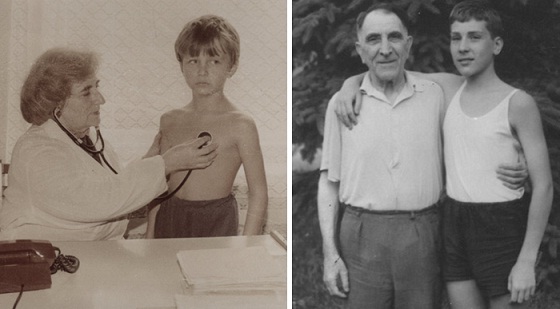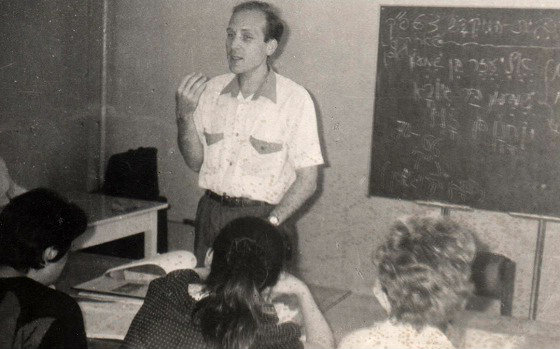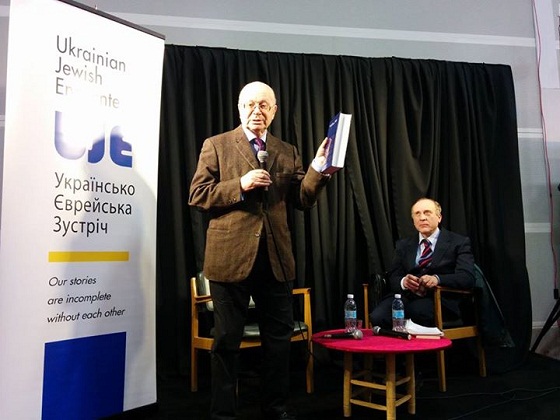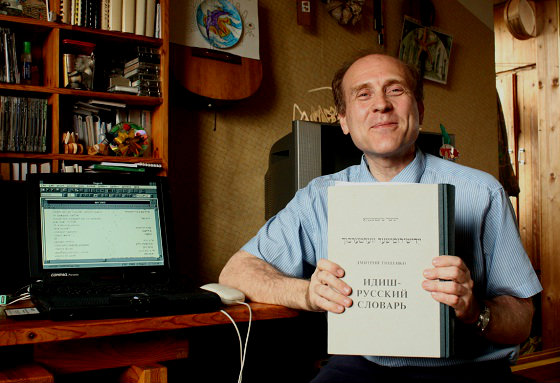Newswe.com: Mame-Loshn with a Ukrainian Accent
Izabella Slutsky, Tel Aviv
Editor’s note: Dmytro Tyshchenko’s Yiddish-Ukrainian dictionary was voted one of the best books of 2015 at the Lviv Book Forum. The following is an interview with Mr. Tyshchenko that appeared earlier in 2015 in the Russian-language publication Newswe.com.
Among the new titles in art, popular science, and educational literature, a new Yiddish-Ukrainian dictionary was introduced at the International Jerusalem Book Fair 2015. The author, Dmytro Tyshchenko, has been collecting material over the past ten years for the world's largest bilingual dictionary, which contains about 70,000 words and expressions.
Yiddish is familiar and intimate to me. For me, it's mame-loshn [Editor’s note: the “mother tongue” in Yiddish]. I heard it from my grandparents, who had eight kids, and from the in-laws, children, and grandchildren. Everyone would get together in the house, and there would always be a feast with Jewish dishes on holidays, and there certainly were Yiddish songs. At school I studied German and I very much feared speaking during a lesson, afraid I would mix up Yiddish and German. My Grandpa gave the Yiddish alphabet to all of his grandchildren, and I later got a Yiddish-Russian dictionary and even brought it to Israel. Unfortunately, I never succeeded in learning to read in Yiddish...Yet, the cantor singing and prayers take me back to my childhood, to the memories of the nearest and dearest...
The unusual biography of the academic Dmytro Tyshchenko attracted my attention not only for his publication, but also for the man himself.
Our conversation started with the question: How did the idea of creating the Ukrainian version of the dictionary arise?
Dmytro Tyshchenko: Most of Russia was outside the Pale of Settlement in the tsarist empire, but Ukraine was entirely within these boundaries. Beginning with the early history of Ukraine, Jews lived permanently on this land in close interaction with the local population, and this couldn't but be reflected in both languages. We do not have a full glossary such as Dahl's dictionary for Russians, which in fact means the language and the people do not exist. This is my deeply pained opinion. Let us turn to a comparison of the Ukrainian language and Yiddish. Both shared a very low status until the 19th century. Yiddish was called “jargon” due to its resemblance to the German language, and Ukrainian was the “Little Russian dialect.” Both languages experienced a meteoric rise during that century and obtained literary status. The ultimate achievements of Jewish Yiddish literature are the works of Mendele Mocher Sforim, Sholem Aleichem, and I. L. Peretz. The pinnacle of Ukrainian literature is the work of Taras Shevchenko, Ivan Franko, and Lesya Ukrainka. All of them were contemporaries. That was also when academic research in each of these languages began.
Izabella Slutsky: Dmytro, your family name, just as that of the President of Ukraine, ends with '-ko' [Editor’s note: Ukrainian family name suffix]. So what is the origin of your love towards Yiddish?
Dmytro Tyshchenko: I was born in a Jewish-Ukrainian family. I am Jewish from my mother's side. The Belarusian-Lithuanian dialect of Yiddish was spoken in our home. As for my paternal grandparents, they communicated with one another in the following way: my grandfather spoke Russian, and my grandmother spoke Ukrainian. In the 1920s, my maternal grandfather Abram Zaleshansky was published frequently in Grodno and Warsaw newspapers in his native language—Yiddish.

Tyshchenko's mother, a pediatrician, at work; Dima with his grandfather Abram in Odessa, 1975 (left).
It was my grandfather who taught me the Hebrew alphabet, and read with me poems in Yiddish. In my grandmother Itka Shmulevna's papers it was stated: “Mother tongue—Hebrew. Speaks Belarusian, Russian, Polish, French, German.” This is the atmosphere I grew in. Shortly before his death, my grandfather tied all the Jewish books into a pile and threw it onto the very top shelf of the cabinet. He believed that no one would ever need them. But he was wrong. My interest in languages woke up early. I took this pile out of the cabinet and started reading these books...But, as far as my mother was a doctor and my father was an agronomist, it was decided to send me to study at the Faculty of Biology at Odessa University.
Izabella Slutsky: So that's the way a biological bond at a high academic level with the Yiddish language appeared! As they say, there was “chemistry”?
Dmytro Tyshchenko: The plain truth is, I couldn't get past the fact that at home they spoke a different language than most people around me. In the summer of 1988, the Leningrad band “Chaverim” visited Odessa. It was the first time I heard Yiddish songs on stage; I used to hear them before only from my grandparents. So I decided not only to learn the language of my ancestors, but also to do everything possible to let others have access to the intellectual wealth created in this language as well.

Dmytro Tyshchenko, a Yiddish teacher, 1990s, Odessa
That was also when the Society of Jewish culture emerged, and I organized Yiddish courses in Odessa. And in 1991, I left for Israel, entered a PhD program at Bar-Ilan University where, under academic adviser Professor Gershon Weiner, I started writing a thesis on Yiddish literature. But...because of financial problems I had to return to Odessa. I was admitted to post-graduate studies at the Department of Biochemistry at the university, defended my thesis ahead of schedule, and at the same time earned a diploma in Germanic philology. And, not having worked a day in my specialization, I started teaching Yiddish at seminars organized by Professor Weiner and publishing Mame-loshn magazine. All this was for the first time and was really engaging...
Izabella Slutsky: What motivated you to get another degree—that of a German philologist—and why did you go to Germany, not to Israel?
Dmytro Tyshchenko: I was drawn to German philology by a desire to practice Yiddish as a profession. Yiddish is very close to German, so that's reasonable. Actually, at school and at the Faculty of Biology I learned English, but there were no vacancies in the English department. So I learned German in a month and passed the first year exam (since, having already one specialization, I was supposed to go to the second year). I made a few mistakes, using Yiddish words instead of German, and got a B. That was the only B for an exam in my life. We found our way to Germany by chance. I was looking for relatives—the Zaleshanskys—all over the world. The Nazis killed my mother’s entire large family—her uncles, aunts, cousins, their spouses and children, parents, and grandparents—in total about a hundred people. The only survivor was the former Soviet officer Alexander Zaleshansky, who lived in Frankfurt. It was an occasion for that moment to go to Germany. While living there, I continued to work on creating a dictionary. With the support of the Jewish Foundation of Ukraine and thanks to a grant from the Canadian organization Ukrainian Jewish Encounter, the Yiddish-Russian and Yiddish-Ukrainian dictionaries were published, and I believe they will be a helpful aid in reading Yiddish literature.
Izabella Slutsky: Do you think that the Yiddish-Ukrainian dictionary will be popular? I mean Ukraine is experiencing the troublesome introduction of Ukrainian as the only state language…
Dmytro Tyshchenko: The dictionary is already really popular. We are out of copies. One category of eager buyers includes Jews who want to learn the language of their ancestors and read the original literature in this language. The other category who needs it, are specialists in the field of Jewish studies. Among them, however, are fewer and fewer Jews. The interest of non-Jews in the Yiddish language and culture is growing worldwide.

To the left—Prof. Wolf Moskovich (Israel) and the author of the dictionary Dmytro Tyshchenko (Germany).
Izabella Slutsky: A well-known Yiddishist Isaac Bargteil, of blessed memory, once said: “There is no nation without a language.” Can there be a language without a people? How many Jews live today in Ukraine and in what age bracket? Can you hear Yiddish in everyday life?
Dmytro Tyshchenko: “A language without a people”—yes, that's witty. I prefer to talk about Yiddish culture as “a head without a body.” Yiddish is not a dead language. It is spoken in religious families, even by children. But not in Ukraine or other countries of the former USSR. There were no conditions for keeping the traditional way of life, and living Yiddish almost couldn't be found. Modern Jewish culture feeds upon memories of childhood, about the parents, and for someone like me—about grandparents. The Holocaust carried away six million European Yiddish speakers. The survivors were repressed by the communist regimes in the USSR and in the countries of the “people's democracy.” They were deprived of their mother tongue by the closing of schools and theaters, by banning religion. But there remained great literature, the folklore of Eastern European Jews, songs, archives, and there are enthusiasts who made Yiddish the point of their life.
Izabella Slutsky: How do you estimate the loss from the vanishing from Jewish culture of Yiddish in the postwar years in Israel? Even now, unfortunately, short programs in Yiddish on Israeli radio are broadcast at an unreasonable time or during some of the Jewish holidays...Well, there are a few vocal folk bands of adults and children, klezmer bands.
Dmytro Tyshchenko: Thanks for the question, I fully agree. Of course Yiddish, which was spoken by approximately 95% of Jews, I believe, was to be the language of the Jewish state. Yiddish was not only a unifier, but also a powerful guarantee against assimilation. I haven't ever seen any writings “Jews for Jesus” in Yiddish, but as for Hebrew—I have! Jews from different countries could explain themselves in Yiddish, and now they need an interpreter. I'm not sure that the majority of Jews in the world speak Hebrew and not English. But even if so, Hebrew is still worlds away from the point of overall diffusion of Yiddish in the Diaspora.

Dmytro Tyshchenko with his dictionary.
Izabella Slutsky: The study of language and preservation of the culture of Eastern European Jews is in the focus of a range of scientific institutions in the world. The National American Center has created an Internet library of Yiddish. How, from your point of view, can it be reclaimed?
Dmytro Tyshchenko: The Internet is particularly important for the preservation of cultural resources in this language because books in Yiddish, released in small print runs in accordance with the number of readers, are expensive.
Izabella Slutsky: Where do they teach Yiddish today in Ukraine?
Dmytro Tyshchenko: At the Kyiv-Mohyla Academy. The teacher is Tanya Batanova. I'm acquainted with her. She is Ukrainian, and she knows the language perfectly well! It's not such a unique event on a global scale, but it deserves full respect. At the Catholic University in Lviv, there's the teacher Asya Fruman. There is also a Yiddish course at the Institute of Jewish Stuides in Kyiv. The Ukrainian language is the official language of the second largest state in Europe, and the Yiddish language limps along like an orphan...But even now Yiddish retains its unifying and counter-assimilation capacity. The leaders of Jewish organizations in the former Soviet Union not by chance have come to realize over time that one can't be a well-bred Jew without knowing the language of their immediate ancestors. I would appreciate it if my dictionary was available in every Jewish organization, at every Jewish school, in every library. This is the purpose of my upcoming visit to Ukraine.
Izabella Slutsky: In general, how often do you visit Ukraine, what is your perception of what is happening there?
Dmytro Tyshchenko: My perception differs from what is inspired by Russian television, which, alas, for many of our emigrants, due to their ignorance of foreign languages, is the only source of information. I feel sorry for these people deceived by Kremlin propaganda. The defamation of Ukraine is comparable to what existed in the days of Hitler in Nazi Germany.
Izabella Slutsky: What is life like for Jews in Germany? What is your impression about communicating with the Germans?
Dmytro Tyshchenko: After the war, they worked long and hard to eradicate antisemitism. I can't find any reason to reproach modern Germany.
Izabella Slutsky: What are your impressions of the International Jerusalem Book Fair and of Israel in 2015?
Dmytro Tyshchenko: I always feel at home in Israel!
Izabella Slutsky: Do come again, and thank you for an interesting conversation. I'm happy to personally wish you success in this noble cause!
* * *
Those interested in Dmytro Tyshchenko's dictionaries can address the author:
(069) 71 03 37 99.
* * *
Dmytro Tyshchenko
Comment on March 28, 2015
I visited Ukraine from February 23 to March 7—for the first time in two years. I enjoyed dozens of new acquaintances and touching unforgettable encounters. I discovered for the first time a young Jewish Lviv, where the chairman of the Society for Jewish Culture is now the student Alexander Nazar. I won’t forget the wise words of his grandfather, the veteran of the Jewish movement Boris Mikhailovich Dorfman, that we must always hold onto being Jewish, and that in today's complex situation, it is important to learn to have mercy for one another, despite political differences (I regret having behaved wrongly in this interview by too openly expressing my pro-Ukrainian position, which, however, personally, I am not going to change, as this is an issue of justice and conscience!). The conversation with the post-graduate student Vladislava Moskalets sank deep into my heart, I was moved by her devotion to Yiddish, and her extreme professional insistence on high standards, both for herself and for others. She is the daughter of the well-known contemporary Ukrainian writer Halyna Pahutyak, and she is efficiently gathering her first experience as a translator from Yiddish. I really wish that Lada’s academic career developed favorably. After all, in the hands of this subtle girl, and also in the hands of Tanya Batanov, is as much as the future of Yiddish in Ukraine. I also got acquainted with Asya Fruman, a young teacher of Yiddish at the Catholic University in Lviv. It turned out that she was attracted to Yiddish in her native Kharkiv by another wonderful young woman who’s just a little bit older than her—Zhenya Lopatnik, a singer, whose knowledge of Yiddish is perfect and who writes her own songs in Yiddish. The Institute of Jewish Studies (this is not a higher education institution, it’s a research institute at the same venue—Kyiv-Mohyla Academy), which is headed by Leonid Finberg, as it turns out, has a team of young researchers who write thoughtful academic works using original texts in Yiddish, and translate fiction and other texts from Yiddish. There, in Kyiv, I met with a wonderful Chernovitser, my older adherent, the ardent enthusiast of Yiddish Mark Finer, whom I had known before only by correspondence. He is a doctor of technical sciences, an honored inventor of Ukraine, and member of the Jewish Council of Ukraine. Yiddish and the effort for its survival, Jewish music, are just his hobbies, but still, anything he tackles turns out great! Now, in the same publishing house, Art Economy, where both of my dictionaries were published, his Mame-Loshn phrasebook with audio-recordings is being prepared for re-release, and a training manual of the Yiddish language for children written by him in collaboration with the young specialists Karina Shirokih of Dnipropetrovsk and Anatoly Kerzhner of Vinnytsia is being prepared for publication. I didn’t have a chance to meet Karina, she went to study abroad, but I met briefly with Anatoly Kerzhner and other wonderful people in different cities of Ukraine who are doing everything possible so that the spiritual wealth created by our people won’t be neglected. Perfectly produced and professionally proofed are the works of Margarita Moiseev (Songs of the Jewish Street, Zhytomyr, 2008) and Tatiana Brivko (Jewish Proverbs, Kharkiv, 2008). I met the authors in Zhytomyr and Kharkiv. Their works indulged my soul. I consider them among the most valuable acquisitions during this trip. I returned home in high spirits. In my head, an accidental, yet symbolic accord, which I proclaimed at the end of my dictionary presentation, does not cease being replayed: ‘Am Yisroel Chai! Long live the people of Israel and the people of Ukraine! Let our beautiful melodious languages live, and flourish, and enrich each other!’
Photos are provided from the personal archive of Dmytro Tyshschenko
Original source: http://www.newswe.com/index.php?go=Pages&in=view&id=7942Document2
Translation from Russian: Miriam Feyga Bunimovich, UJE
Additional translation and editing by Peter Bejger



















